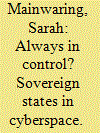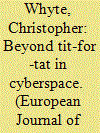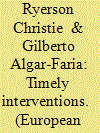|
|
|
Sort Order |
|
|
|
Items / Page
|
|
|
|
|
|
|
| Srl | Item |
| 1 |
ID:
173365


|
|
|
|
|
| Summary/Abstract |
For well over twenty years, we have witnessed an intriguing debate about the nature of cyberspace. Used for everything from communication to commerce, it has transformed the way individuals and societies live. But how has it impacted the sovereignty of states? An initial wave of scholars argued that it had dramatically diminished centralised control by states, helped by a tidal wave of globalisation and freedom. These libertarian claims were considerable. More recently, a new wave of writing has argued that states have begun to recover control in cyberspace, focusing on either the police work of authoritarian regimes or the revelations of Edward Snowden. Both claims were wide of the mark. By contrast, this article argues that we have often misunderstood the materiality of cyberspace and its consequences for control. It not only challenges the libertarian narrative of freedom, it suggests that the anarchic imaginary of the Internet as a ‘Wild West’ was deliberately promoted by states in order to distract from the reality. The Internet, like previous forms of electronic connectivity, consists mostly of a physical infrastructure located in specific geographies and jurisdictions. Rather than circumscribing sovereignty, it has offered centralised authority new ways of conducting statecraft. Indeed, the Internet, high-speed computing, and voice recognition were all the result of security research by a single information hegemon and therefore it has always been in control.
|
|
|
|
|
|
|
|
|
|
|
|
|
|
|
|
| 2 |
ID:
173364


|
|
|
|
|
| Summary/Abstract |
At present, most scholarship on the potential for escalation in cyberspace couches analysis in terms of the technological dynamics of the domain for relative power maneuvering. The result has been a conceptualisation of the logic of operation in cyberspace as one of ‘tit-for-tat’ exchanges motivated by attribution problems and limited opportunity for strategic gain. This article argues that this dominant perspective overlooks alternative notions of how cyber tools are used to influence. This, in turn, has largely led scholars to ignore second-order effects – meaning follow-on effects triggered by a more direct outcome of an initial cyber action – on domestic conditions, institutions, and individual stakeholders. This article uses the case of cyber-enabled political warfare targeting the United States in 2016 to show how escalation can occur as a second-order effect of cyber operations. Specifically, the episode led to a re-evaluation of foreign cyber strategy on the part of American defence thinkers that motivated an offensive shift in doctrine by 2018. The episode also directly affected both the political positions taken by important domestic actors and the attitude of parts of the electorate towards interference, both of which have reinforced the commitment of military planners towards assertive cyber actions.
|
|
|
|
|
|
|
|
|
|
|
|
|
|
|
|
| 3 |
ID:
173366


|
|
|
|
|
| Summary/Abstract |
The cyber realm is increasingly vital to national security, but much of cybersecurity is provided privately. Private firms provide a range of roles, from purely defensive operations to more controversial ones, such as active-cyber defense (ACD) and ‘hacking back’. As with the outsourcing of traditional military and security services to private military and security companies (PMSCs), the reliance on private firms raises the ethical question of to what extent the private sector should be involved in providing security services. In this article, I consider this question. I argue that a moderately restrictive approach should be adopted, which holds that private firms can justifiably launch some cybersecurity services – defensive measures – but are not permitted to perform others – offensive measures.
|
|
|
|
|
|
|
|
|
|
|
|
|
|
|
|
| 4 |
ID:
173363


|
|
|
|
|
| Summary/Abstract |
How do public protests emerge and become impotent? Inspired by Žižek's ideology critique, the article examines the ideological underpinnings of contemporary public-private security governance and suggests that worried, complaining subjects are a product of a dominant discourse of expert knowledge and technification. It then introduces three Žižekian dynamics that prevent protests from challenging the prevailing discourse – particularisation, ultra-politics, and cynicism – and illustrates these dynamic through a case study of the history of public complaints about Facebook. The article suggests that Facebook communicates through a discourse of technification whereby it constantly invents technological fixes unable to satisfy the complaints. The article further suggests that Facebook turning into a national security partner in the fight against terrorism online prevents complaints from becoming universalised by rendering even particularised privacy contestations illegitimate. This is reinforced, the article argues, by the subject's cynical enjoyment; that is, the ‘letting off steam’ on Facebook while criticising it.
|
|
|
|
|
|
|
|
|
|
|
|
|
|
|
|
| 5 |
ID:
173362


|
|
|
|
|
| Summary/Abstract |
While there has been a long engagement with the impact of time on peacebuilding policies and practice, this engagement has to date focused predominately on issues of short- versus long-term initiatives, and of waning donor support for such initiatives. More recently, the critical peacebuilding turn has focused attention on the politics of the everyday as being essential to emancipatory endeavours enacted through localisation. Yet despite this, time itself has not been the subject of analysis, and the politics of time have not been integrated into the study of peacebuilding. This article, drawing both on historical institutionalist and on critical international studies analyses of temporality, provides a framework for analysing the impacts of time on the potential to achieve emancipatory peace. Drawing on extensive fieldwork in Bosnia and Herzegovina and in Cambodia, this article asserts that a focus on Policy Time, Liberal Political Time, and Intergenerational Time highlights how peacebuilding initiatives are framed by disparate timescapes that limit the visibility of local chronopolitics, and that this in turn restricts local empowerment and resistances.
|
|
|
|
|
|
|
|
|
|
|
|
|
|
|
|
| 6 |
ID:
173361


|
|
|
|
|
| Summary/Abstract |
Since its inception in 2000, the Women, Peace and Security (WPS) agenda has conceptualised the conflict-affected woman as a subject worthy of international attention, protection, and inclusion. In the wake of Europe's ‘refugee crisis’, this article examines how the remit of WPS has broadened from women in conflict zones to refugees in Europe's borderlands. A minority of European states now attend, in their WPS policy, to these conflict-affected women on the move. This inclusion productively challenges established notions of where conflict-affectedness is located. It exposes Europe as not always peaceful and safe for women, especially refugees who flee war. Conversely, the dominant tendency to exclude refugees from European WPS policy is built on a fantasy of Europe as peaceful and secure for women, which legitimises the fortressing of Europe and obscures European states’ complicity in fuelling insecurity at their borders, cultivating an ethos of coloniality around the WPS agenda. The inclusion of refugees is no panacea to these problems. If focused solely on protection, it repositions European states as protective heroes and conflict-affected women as helpless victims. The WPS framework nonetheless emphasises conflict-affected women's participation in decision-making and conflict prevention, opening space for recognising the refugee women as political actors.
|
|
|
|
|
|
|
|
|
|
|
|
|
|
|
|
|
|
|
|
|